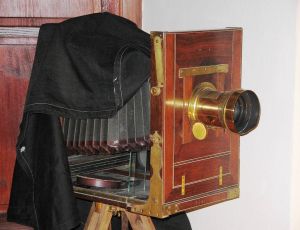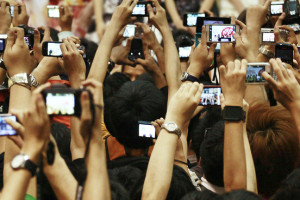There’s no question that smartphones have become an intimate part of our daily lives but I noticed that lately they’ve been getting a bad wrap as a possible danger to the privacy and security of others. For instance, the Huffington Post published a recent “Guide to not getting arrested” when using a smartphone at the election polls. Additionally, the New York Times wrote about efforts to ban Smartphones in Gyms. For a third example, many New York restaurants have launched an informal ban on taking photos of food. According to DigitalTrends, even a number of musicians like Prince, Beyonce and Bjork are banning the use of smartphone cameras at concerts. In this climate of rising concerns about the impact of smartphones on society it may be that the problem isn’t native to smartphone at all. To explain, let me take you back to the beginning of another technological innovation: the photograph.
[Cue Tardis time-travel music]
When the first compact camera was built at the end of the eighteenth century it didn’t take long for people to realize that a photo could be taken on Wednesday and placed in a major newspaper on Thursday. In short, the activities that comprise our private, personal and public lives could now be documented and shared outside of our control. Photographs were clearer and more reliable than human memory too, so naturally photos became increasingly trusted media. People loved that images could be captured and stored as momentos but the photograph endangered brands and leaders because those that would espouse a belief but fail to behave in accordance with it could suddenly be held accountable. A flurry of HIPAA and Confidentiality laws like the Electronic Communications Privacy Act of 1986 (ECPA), Computer Fraud and Abuse Act 1984 and Childrens Online Privacy Protection Act of 1998 (COPPA) were passed to protect the privacy of individuals but the social norms at the time were woefully inadequate. Today, Americans (along with the rest of the world) are still adjusting social norms to catch up with the pace of evolving technologies. In other words, like the Truman Show life is a little different when it’s spent on camera – and that could take a little getting used to.
The Smartphone was key in this process because it spawned a generation of amateur photographers. But privacy concerns haven’t been limited to smartphones. Cameras on other devices have been in the news too. According to the Los Angeles Times, Drones also bring up similar privacy concerns plus they enable photography from an anonymous, remote location. Regardless of the gadget, information can now be shared wider and with greater ease in this new world via mobile enabled social media too. Ultimately, the photograph always had the power to hold individuals or brands accountable for their actions. The difference now is that mobile has enabled the photograph to be a much more potent force for accountability than it has ever been.
But what does this mean for brands today?
Well, marketers looking to engage mobile users probably will want to be conscientious of these privacy issues and understand that the smartphone (despite all the guff it gets) is actually loved very much by most of us – so much so that statistically it’s likely that while reading this article your phone is within reach. Respecting that relationship will be a paramount concern for marketers. Photos present some other challenges too. Brands have reputations to manage so content that jeopardizes the state of that reputation may be viewed as a threat to economic prosperity. Furthermore, the matter of who owns what content factors into the legalese of it all, which impacts how images can be used in court. Remember when Facebook bought Instagram and then essentially said “now we own all your photos”?
There may have been more to that move than many of us realized.
Personally, I view privacy laws being passed as societies way of adjusting social norms. Call it a techno-cultural evolution. Ultimately, it may be helpful to differentiate smartphone activities and regulate the behavior that we want to correct. In this case our rabble-rouser is the photograph, so is it fair that laws should be levied against our beloved smartphones? Is this the only way to create social norms around new (potentially disruptive) technology or is it possible for people to regulate their etiquette through sheer decency?




6 Responses to Smartphones and Privacy: A View of Evolving Culture